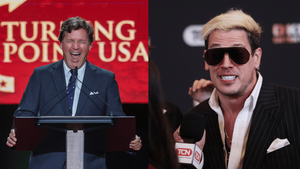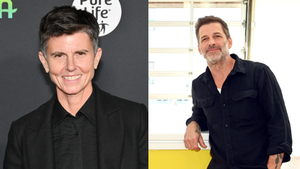Treatment GuideJust DiagnosedSex & DatingAfrican AmericanStigmaAsk the HIV DocPrEP En EspañolNewsVoicesPrint IssueVideoOut 100
CONTACTCAREER OPPORTUNITIESADVERTISE WITH USPRIVACY POLICYPRIVACY PREFERENCESTERMS OF USELEGAL NOTICE
© 2025 Pride Publishing Inc.
All Rights reserved
All Rights reserved
By continuing to use our site, you agree to our Privacy Policy and Terms of Use.
Long shuffled into the fringes of society'or even sent to prison'supporters of needle-exchange programs are indignant about their perennially second-class status in the nation's fight against HIV. Sixteen years since the advent of needle-exchange programs in the United States, the movement still exists in a confused limbo: spurned by an ongoing federal funding ban, a scattering of scornful elected officials, and most important, an ambivalent public. Today in the United States there are 183 known needle-exchange programs, most of which wage an uphill battle to secure funds and to fight for legal legitimacy. The need for them is great, since about a quarter of all HIV infections in the United States have been a direct result of illicit-drug users' sharing of needles and the United States has approximately 1.5 million habitual injection-drug users who shoot up 920 million to 1.7 billion times annually, according to a study by Scott Burris, a law professor at Temple University who specializes in HIV law issues. But needle-exchange programs distribute a relatively paltry 15 million to 20 million syringes each year. According to Dave Purchase, who founded one of the nation's first needle exchanges, in Tacoma, Wash., in 1988, approximately half of U.S. programs hobble along under some sort of legal or funding cloud, since in many localities they are not fully sanctioned by the government. Over the past year, he says, four out of seven start-up programs never even got off the ground. To advocates, these statistics are infuriating. They believe widespread support of needle-exchange programs is long overdue, since the scientific data, including that from eight major government studies, indicate almost unanimously that the programs not only reduce drug use but also lower crime rates, the amount of dirty needles left on community streets, and HIV transmission rates. In fact, advocates of the programs point out, of all HIV prevention methods needle exchanges reduce infection rates the most dramatically. For example, half of all injection-drug users in New York City had HIV in the early 1990s, according to public-health data, but that figure has dropped to 12%. Supporters credit syringe exchanges for the decline. Kind and Budget-Conscious The programs are so beneficial, the general argument goes, that they are a cost-effective way to reduce the $50 billion that injection-drug users cost society annually. For example, needle-exchange programs spend between $20,000 and $35,000 to avert one HIV infection in the injection-drug-user population'compared to the estimated $190,000 lifetime cost of treating a person infected with HIV. Furthermore, these figures do not take into account money saved on the treatment of any number of other people who one person did not in turn infect. Advocates say the difficulty of garnering support for their cause is not so much the result of a vocal minority fighting against them'the voices of opposition are few and far between. But there is a lack of political will to fight for the benefit of one of society's most disenfranchised populations. 'There's a political dynamic where the people who want needle exchanges'or who will benefit from needle exchanges'are not particularly vocal or important,' Burris says, 'although they try.' The various headliners who fervently oppose needle-exchange programs include, most notably, the Family Research Council and U.S. representatives Marilyn Musgrave and Mark Souder. Their critics, however, believe such people ignore established scientific data in favor of a moralistic stance against illicit drug use. 'All the opposition to needle-exchange programs is based on political or conservative moral values,' Purchase says. 'There is no scientific opposition. There is no evidence that we do not do exactly what we say we do.' Burris adds that 'conservatives, or rather 'cautious' politicians, often see a downside to [advocating for needle-exchange programs] that far exceeds any upside.' And lawmakers shy away from the issue for fear of its symbolism, because they fear it sends a message to constituents that they are permissive toward injection-drug users, since conservative detractors often refer to advocates of such measures as being 'soft on drugs.' Even Less Support Republicans, though, are not the only ones with misgivings about needle-exchange programs. In 1998 then-president Bill Clinton refused to lift the ban on federal funding for the programs even though the government by that point had solid evidence supporting their efficacy. Also, Democratic New Jersey governor James McGreevey refuses to allow publicly run needle exchanges in his state, which is infamous for having'not coincidentally, syringe-exchange advocates say'both the worst epidemic of HIV among injection-drug users and the nation's most stringent laws against the programs. Meanwhile, on the other side of the political divide, New York's Republican governor, George Pataki, signed a law in 2000 allowing anyone to buy syringes from a pharmacy without a prescription. 'The fact of the matter is, because there's no great demand for [the deregulation of syringe-access laws] politically, there's no great punishment for it,' Burris says of the lack of political fallout for Pataki's action. Representative Souder, Congress's chief critic of federal HIV-prevention spending, would disagree. As chairman of the House Subcommittee of Criminal Justice, Drug Policy, and Human Resources, he has infamously scrutinized AIDS groups for spending tax dollars on programs that allegedly violate the ban on federal money spent 'promoting' homosexuality. Consequently, the National Institutes of Health recently warned grant seekers to avoid phrases like sex worker or needle exchange or men who have sex with men in their applications lest they subject themselves to congressional scorn. In April, Souder sent a letter to the NIH lambasting needle-exchange programs, insisting that they actually lead to an increase in drug abuse and overdoses. Ignoring a 1999 survey that showed 97% of all needle-exchange programs provide additional services, Souder insisted that most programs do nothing more than impersonally exchange needles before sending clients on their way. The letter unleashed a torrent of protest from syringe-exchange supporters. In an e-mail to HIV Plus, Souder shrugged off the concerns of researchers who accused him of misinterpreting their data for political purposes. He insists he was not biased against needle-exchange programs, saying rather that it is his responsibility to make sure American tax dollars are used effectively. 'Harm reduction'a more accurate term is harm maintenance'merely enables the continuation of drug abuse and high-risk behaviors without addressing the real health threats faced by an injection-drug user,' Souder wrote. 'This is an upside-down approach that sends the wrong message on both drug use and public health.' But Purchase sees the other side of the coin. 'It's true we are enablers,' he says. 'We enable people to stay alive.' When People Do Care Even though Souder is something of a lone wolf on this issue, most needle-exchange program advocates do not foresee a reversal of the federal funding ban anytime soon. So while major local governments like San Francisco and New York have in recent years begun to pony up significant public funds, a vast chunk of the money must come from private funding. Philanthropist George Soros has given millions to support both drug-policy reform and needle-exchange programs. The American Foundation for AIDS Research has pumped over $4 million into the cause. And over the past summer three groups'the Levi Strauss Foundation, the Tides Foundation, and the National AIDS Fund'announced a pending two-year grant cycle during which they will collaboratively distribute $1 million for needle-exchange programs. Allan Clear, executive director of the Harm Reduction Coalition, a nationwide group that advocates for drug users, says that if the federal ban were not in place, local jurisdictions would be more likely to open their coffers. 'Without federal support in any way,' he says, '[needle-exchange programs] have to hunt around for some kind of legitimacy.' Clear bemoans the heavy red tape that local governments wrap around needle exchanges, which makes them extremely difficult to run in many places. For example, the state of New York requires groups to apply for a waiver to operate. Program supporters complain the process is so arduous that it severely limits the number of groups able to function. In California participating counties must declare a 'state of emergency' every two weeks to run needle-exchange programs. In cities like Sacramento, where the county board of supervisors refuses to declare the emergency, programs are forced underground. Ousted California governor Gray Davis, a Democrat, vetoed two bills over the past two years that sought to eliminate the need to reauthorize the states of emergency, but advocates are hoping that Republican governor Arnold Schwarzenegger will feel differently this fall. 'I think there would be less of this kind of rigorous oversight if we had federal support,' Clear says. 'If we had someone at the federal level saying 'We want to do this because it works,' maybe some of the barriers would be reduced.' And there are barriers aplenty. According to Burris's study'which was conducted in 2003 for the CDC Collaborating Center Promoting Public Health Through Law, a joint effort of Georgetown and Johns Hopkins universities'there is a 'climate of uncertainty' about the syringe-exchange laws across the country. Each state has a different set of laws that affect needle-exchange programs, and they work as a conflicting patchwork'often discouraging users from accessing the programs. For example, in 30 jurisdictions where needle-exchange programs operate it is still a crime for an injection-drug user to possess a dirty syringe. In about 19 states, Burris says, the programs operate without a clear claim to legality. Consequently, since 1986, at least 36 needle-exchange program volunteers have been arrested. Final Nail in the Coffin? A prime example of how such an arrest can strike a fatal blow to a needle-exchange program is in the battleground state of New Jersey, one of four states that forbid all forms of public access to syringes. In a state where more than half of all HIV cases are caused by needle sharing'twice the national average'all attempts at establishing exchange programs have been successfully thwarted. In 1999 Chai Project, an AIDS service organization, folded its program in defeat following the arrest of a volunteer'reducing the number of programs in the state to zero. In July the organization shuttered permanently because of a lack of funds. Governor McGreevey has held fast to his position that he will allow needle-exchange programs only if they are run by hospitals. The governor's spokesman, Micah Rasmussen, says McGreevey is against municipal programs 'because he thinks that municipalities are ill-equipped to provide health-based services and are not regulated like hospitals are.' 'Of course there are no hospital-based programs in the country!' quips Roseanne Scotti, director of the Drug Policy Alliance of New Jersey. 'It's not the way it's ever been done.' Her office has been instrumental in prompting officials in both Atlantic City and Camden to pass resolutions over the summer that will establish exchanges in their communities. They are in for a fight, however. County prosecutors in both areas have promised to block both programs and to take the case to the New Jersey supreme court if necessary. Jay Petillo, the former executive director of Chai Project, shakes his head in wonder at the governor's obstinacy. 'People in New Jersey who are educated on the issue want syringe exchanges'either because it'll save lives or because it'll save money,' he says. 'And people who are not educated on the issue don't care.' Therein lies the rub: An invisible group of people with no voice cannot be heard by a public that sees the HIV war as one that is fought in bedrooms. The leaders of the anti-HIV movement, historically gay white men, often have little in common with injection-drug users. And it takes a leap of the imagination for the public to understand that people who get HIV from injections could ultimately infect nonusers through sexual contact. Rep. Anna Eshoo, who endorsed a pro'needle-exchange platform in her first campaign for Congress, in 1992, says perhaps the public would benefit from observing the success of syringe exchanges firsthand. 'I think that it would be well to maybe travel and look at the very, very responsible public-health initiatives,' she says. 'This is about saving lives. It can be done responsibly, and it can be done well.'
From our Sponsors
Most Popular
“So much life to live”: Eric Nieves on thriving with HIV
September 03 2025 11:37 AM
Thanks to U=U, HIV-positive people can live long, happy, healthy lives
July 25 2025 2:37 PM
The Talk: Beyond the exam room
August 13 2025 3:15 PM
BREAKING: Supreme Court rules to save free access to preventive care, including PrEP
June 27 2025 10:32 AM
Messenger RNA could be the key to an HIV vaccine — but government cuts pose a threat
August 20 2025 8:02 AM
“I felt like a butterfly”: Niko Flowers on reclaiming life with HIV
July 23 2025 12:22 PM
Dancer. Healer. Survivor. DéShaun Armbrister is all of the above
July 02 2025 8:23 PM
The Talk: Starting the conversation
July 25 2025 4:47 PM
The lab coat just got queer
August 21 2025 10:00 AM
Plus: Featured Video
Latest Stories
HIV-positive men stage 'Kiss-In' protest at U.S.-Mexico border
December 01 2025 12:56 PM
What the AIDS crisis stole from Black gay men
December 01 2025 6:00 AM
Amazing People of 2025: Javier Muñoz
October 17 2025 7:35 PM
It’s National PrEP Day! Learn the latest about HIV prevention
October 10 2025 9:00 AM
“I am the steward of my ship”: John Gibson rewrites his HIV narrative
September 16 2025 2:56 PM
The Talk: Owning your voice
August 25 2025 8:16 PM
The Talk: Navigating your treatment
August 01 2025 6:02 PM
How the Black AIDS Institute continues to fill in the gaps
July 25 2025 1:06 PM
1985: the year the AIDS crisis finally broke through the silence
June 26 2025 11:24 AM
VIDEO: A man living with HIV discusses his journey to fatherhood
June 10 2025 4:58 PM
Trump admin guts $258 million in funding for HIV vaccine research
June 03 2025 3:47 PM
Grindr is reminding us why jockstraps are so sexy and iconic
May 02 2025 5:36 PM
HRC holds 'die-in' to protest Trump health care cuts
April 28 2025 2:11 PM
Two right-wing Supreme Court justices signal they may uphold access to PrEP and more
April 21 2025 4:10 PM
500,000 Children at Risk: PEPFAR Funding Crisis
April 08 2025 3:51 PM
Broadway's best raise over $1 million for LGBTQ+ and HIV causes
April 03 2025 7:15 PM
The Talk Season 5 premieres this spring with HIV guidance for the newly diagnosed
March 26 2025 1:00 PM








































































